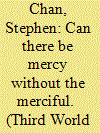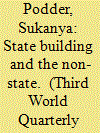|
|
|
Sort Order |
|
|
|
Items / Page
|
|
|
|
|
|
|
| Srl | Item |
| 1 |
ID:
136465


|
|
|
|
|
| Summary/Abstract |
This article proposes to move beyond the categories of altruism and self-interest in the analyses of the motives for development cooperation. This opposition ignores the inherently moral nature of development policy. The article illustrates the shortcomings of such a perspective by tracing the metaphor of the merchant and the clergyman as archetypical figures shaping Dutch development policy. Through these images the suggestion of an opposition between moral and amoral motives in the history of development has gained a strong foothold within the interplay of scholars, policy makers and public opinion. We go on to assess claims about economy, security, solidarity, prestige and guilt, and ecology, which have been brought forward to legitimise Dutch foreign aid. This analysis calls for research on the dynamics of the transnational exchanges of ideas, interests and expectations, especially during episodes when the moral validity of policy has been explicitly contested.
|
|
|
|
|
|
|
|
|
|
|
|
|
|
|
|
| 2 |
ID:
136470


|
|
|
|
|
| Summary/Abstract |
Martha Nussbaum raised profound concerns about aid as being conceived out of the self-directed charity of donors and not the expressed concerns of those being aided. Even when the recipients of aid seek to express their concerns, their capabilities may not recognise their own conditions and desirable remedies. This paper agrees that Nussbaum’s questions are profound, but argues that even they do not go far enough.
|
|
|
|
|
|
|
|
|
|
|
|
|
|
|
|
| 3 |
ID:
136469


|
|
|
|
|
| Summary/Abstract |
This paper has two objectives. First, it aims to analyse how transnational agricultural traders are positioning themselves in, and capitalising on, the financialisation of agriculture. Second, it seeks to position land investments in this process. This is done by situating Cargill – one of the largest agricultural trading companies in the world – into the transformation of agriculture in the world economy and by assessing its strategies of adaption through private equity-driven land investment in the Philippines. The article notes, following Burch and Lawrence, that the transforming position of agriculture is created by reshaping relationships in the agri-food supply chain and is based on the logic of finance capital. An example of this process from the Philippines is provided, where Cargill’s private equity arm – Black River Asset Management– is investing in land through equity acquisitions of a Philippine company, Agrinurture, in a manner that allows the company to adapt to national and local dynamics. The evolving and deepening connection between finance and agriculture is presented first, followed by a discussion of how Cargill fits into this transition in the Philippine context.
|
|
|
|
|
|
|
|
|
|
|
|
|
|
|
|
| 4 |
ID:
136466


|
|
|
|
|
| Summary/Abstract |
This article focuses on a seeming contradiction between ‘Islamophobic’ and ‘Islamophilic’ approaches in contemporary Western policies and discourses on the Middle East. While Islamophobia continues to shape some domestic policies of Western states and provide ideological justification for the wars they wage abroad, ‘Islamophilic’ tendencies in foreign policy have also emerged, especially in responses to the ‘Arab Spring’. Not clearly noted in Western public discourse, this represents a historical continuation of Western support for Islamism common during the Cold War, but is also a shift from the Islamophobic discourse of the post-cold war period, especially since 9/11. While Islamophobic and Islamophilic discourses may appear to be opposites, the paper argues that they represent two sides of the Orientalist logic, continuing to reduce understanding of Middle Eastern societies and politics to a culturalist dimension. Unlike traditional Orientalism, they treat Middle Eastern people as political subjects, but approach them as defined by their culture and religion. They define ‘moderate’ Islamism as the typical (and preferred) politics of the people of the region. Focusing on specific recent developments, the paper suggests that, rather than paving the way to more peaceful relations with the region or to internal peace and stability there, the Islamophilic shift in Western policy may rather lead to new waves of catastrophes by further destabilising and fragmenting the region, threatening to evoke new waves of Islamophobia in the West.
|
|
|
|
|
|
|
|
|
|
|
|
|
|
|
|
| 5 |
ID:
136462


|
|
|
|
|
| Summary/Abstract |
This article seeks to explain institutional change in international patent politics since the conclusion of the 1995 Agreement on Trade-Related Aspects of Intellectual Property Rights (trips). I argue that the distribution of interests in this issue area adheres to a sharp North–South distinction, and that the pursuit of largely incompatible and conflicting patent agendas by industrialised and developing countries, respectively, has led to the gradual emergence of an international patent regime complex. Focusing on trips-plus measures under various Free Trade Agreements, patent enforcement clubs and a range of UN organisations which have recently gained relevance for international patent politics, I show how the distribution of interests in this area has led to the development of two parallel and partially inconsistent international governance structures. I conclude that the distribution of interests explains the propensity of regime complexes towards stability and change, with institutional change being particularly pronounced when overlapping interests among revisionist actors enhance the prospects of collective action.
|
|
|
|
|
|
|
|
|
|
|
|
|
|
|
|
| 6 |
ID:
136468


|
|
|
|
|
| Summary/Abstract |
This article critically explores the implications of the recent turn to transnational efforts in activism that seeks to counter caste-based discrimination. In particular, it analyses the consequences of mobilising a concept of caste that is sufficiently expansive to accommodate occupation- and descent-based discrimination globally, and which primarily frames caste in terms of human rights. To what extent is it possible to maintain a nuanced conceptualising of caste and of what it means to occupy the margins of the caste system, if efforts to influence the workings of global governance institutions divest caste of its regional and local distinctiveness? The article demonstrates how, even though Dalit (‘untouchable’) activists have been successful in bringing attention to caste as a global concern, present endeavours, on the one hand, reinforce the marginalised identity that they seek to overcome and, on the other, fail to recognise the diversity and situated-ness of the Dalit experience.
|
|
|
|
|
|
|
|
|
|
|
|
|
|
|
|
| 7 |
ID:
136467


|
|
|
|
|
| Summary/Abstract |
Michels’ ‘iron law of oligarchy’ suggests that oligarchic party rule is inevitable, yet many parties have shown a strong commitment to intra-party democracy. However, Turkey’s akp is a typified case of Michels’ law, displaying an explicit commitment to intra-party democracy, only to later abandon it. I ask what factors have facilitated this transformation. Why does the iron law of oligarchy display itself in some parties but not in others? I argue that intra-party democracy owes its existence to three indicators – inclusiveness, decentralisation and institutionalisation. Conversely, it should be observed that a party shifting from democratic to oligarchic or personalistic intra-party rule will display decreasing levels of these three indicators in terms of policy formation and candidate selection. By tracing akp’s internal party operations since its founding in 2001, I demonstrate a gradual deterioration in these indicators, reflecting a gradual deterioration of democracy within the party to oligarchy and then to personalism.
|
|
|
|
|
|
|
|
|
|
|
|
|
|
|
|
| 8 |
ID:
136463


|
|
|
|
|
| Summary/Abstract |
Global Health Partnerships (ghps) have become ubiquitous within global health governance (ghg). Even before the onset of the global financial crisis public–private partnerships (ppps) were an omnipresent policy tool in global health and in the current austerity climate ppps have been heralded as an effective way to address a growing resource gap in ghg. Despite their omnipresence, ghps have not received adequate attention from critical scholars; few efforts have been made conceptually and theoretically to grasp how ppps are transforming the logic of ghg. We argue that ghps have contributed to the emergence of a complex global health governance architecture in which private solutions (market mechanism) are generally privileged over public approaches. Drawing on Gramscian conceptualisations of public/private, we suggest that the reshaping of the private and public realm inherent to ppps represents a further deepening of the neoliberal management of individuals and populations, allowing private interest to become more embedded within the public sphere and to influence global and national health policy making. This undermines the attempt to improve global health results as the inequitable distribution of social determinants of health, especially poverty and social exclusion, remain the main barriers to achieving health for all.
|
|
|
|
|
|
|
|
|
|
|
|
|
|
|
|
| 9 |
ID:
136460


|
|
|
|
|
| Summary/Abstract |
Revisiting the events leading to the collapse of Third World summitry in 1965, this article proposes that the rise and fall of Third World unity efforts in the years 1955–65 originated from the unsuccessful attempt by industrialised Afro-Asian (aa) countries to turn unindustrialised aa states into their export markets. As a case study, this article explores Egypt’s economic foreign policy towards other aa countries and its activity within the aa and the Non-aligned movements, and compares Egyptian strategy in this field with that of China and Ghana.
|
|
|
|
|
|
|
|
|
|
|
|
|
|
|
|
| 10 |
ID:
136464


|
|
|
|
|
| Summary/Abstract |
This article unpacks the relationship between state building and the non-state. While accepting both the positive and corrosive characteristics of non-state actors and informal practices of governance, it attempts to (1) advance an argument in favour of mainstreaming ‘non-state’ forms that are positive and useful for state building; and (2) highlight the tensions between the practice of state building and the reality of the non-state. In thinking beyond the state and non-state dichotomy, the article seeks to identify factors that are necessary if state-building programmes are to work in complex environments. Drawing on received wisdom from recent experiences, this conceptual study focuses on important contextual, local, political and legitimacy issues to highlight prominent dilemmas. The conclusion suggests four policy-relevant lessons that reinforce the argument in favour of mainstreaming the non-state agenda into the critical thinking about security and development.
|
|
|
|
|
|
|
|
|
|
|
|
|
|
|
|
| 11 |
ID:
136461


|
|
|
|
|
| Summary/Abstract |
Debates about US empire have subsided somewhat in the aftermath of the George W Bush presidency but the issues underlying such debates have not gone away. In arguing that the history of the United States is an imperial one, this article proposes that US empire is the expression of an intersectional totality, one shaped by various vectors of power but reducible to none. To make this case, the article presents a sketch of US imperial history in order to show how this intersectional totality has evolved over time. Such an exercise can give useful context to the foreign policy initiatives of the Barack Obama administration, one that differs from that of its immediate predecessor but is not outside the structure of imperial history’s longer duration.
|
|
|
|
|
|
|
|
|
|
|
|
|
|
|
|
|
|
|
|
|